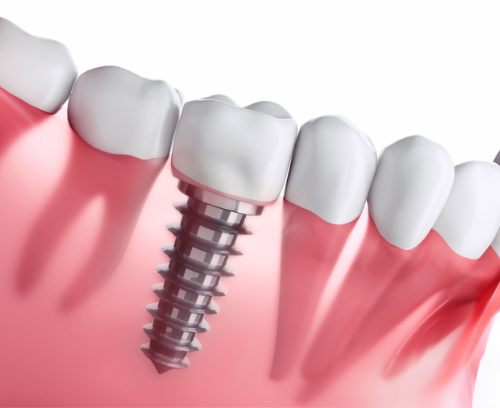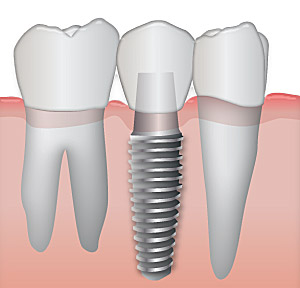What Can I Do About a Loose Dental Implant?
My dentist placed three implants in January, and now one of them is loose. I am concerned about what went wrong and am losing trust in my dentist. What options might a dentist give me for fixing a loose dental implant? Thank you. Manal from Seattle
Manal,
Thank you for contacting our office. Although Dr. Michalski would need to examine your implant, we can explain factors that affect treatment for a lose implant.
What Can You Do About a Loose Dental Implant?
If your dental implant is loose, you should promptly contact your implant dentist, oral surgeon, or periodontist. Your doctor will examine the implant parts and gum tissue and take a 3-D CT scan of your bone to identify why your implant is loose. Your doctor will recommend treatment based on the cause of the loose implant.
Why Get Prompt Treatment for a Loose Implant?
You should get prompt treatment for a loose dental implant because it is a threat to your oral health. Without treatment, an infection can develop and worsen. If there is any chance of saving the implant, delaying treatment will result in dental implant failure. Implant parts include an artificial root, an abutment (connector), and a dental crown. Although dental implants have a 95 percent success rate, an untreated loose implant will fail.
What Causes a Loose Dental Implant?
Faulty implant parts, gum disease, implant location, failed osseointegration (fusion of the implant and bone), and other factors can contribute to a loose dental implant. But you will need an exam from your doctor to determine the culprit.
- Implant quality, type, or size – Faulty design of the artificial root or abutment or using the wrong implant type or size can weaken and loosen it.
- Implant location – If an implant is not in the optimal place, it can loosen.
- Insufficient torque – If your doctor does not sufficiently secure the implant in your bone, it can loosen.
- Lack of bone volume – Areas of low bone volume will not support an implant.
- Gum disease – Diseased gum tissue destroys bone tissue and leaves implants without support.
- Stress on the implant – Prematurely attaching replacement teeth to implants can loosen them. Also, failure to maintain a soft-food diet can disturb implant sites and cause looseness.
- Failed osseointegration – Implants will be unstable if the jawbone and implant do not fuse.
What Is the Treatment for a Loose Dental Implant?

- Implant removal
- Gum disease treatment
- Bone graft
- Three to four months of healing
- Replacing the implant, possibly in a new position
- Alternative treatment
A skilled implant dentist can restore your oral health and help your dental implants succeed with proper planning.
Dr. Thaddeus Michalski, a Rocky Hill, Connecticut dentist and Diplomate of the International Congress of Oral Implantologist, sponsors this post.
Implant-Supported Dentures in Rocky Hill for a More Secure Smile

Are Dental Implants in Rocky Hill Right for You?

(more…)
Considering Dental Implants in Rocky Hill

Dental Implants in Rocky Hill: A Good Choice for You?

Dental Implants in Rocky Hill
Dr. Thaddeus Michalski, Your Implant Dentist in Rocky Hill
It may be due to the economy, or in response to supply and demand, but lately there have been a lot of dentists advertising dental implants and what the fee is for those implants. In some respects, we’d hope you wouldn’t shop for a dentist based solely on price, especially a surgical procedure, but I also operate with a budget and realize saving money is important and getting affordable dental implants is a worthwhile pursuit. So I’d thought I’d suggest a few things to look for and ask, when looking for a deal for dental implants.
The first thing is what exactly does the fee include. A dental implant to replace a missing tooth is comprised of 3 parts. Part 1 is the implant itself, it is placed in the bone and serves as the anchor for the new tooth. Part 2 is the abutment. The abutments is the connection between the implant and crown. The last part is the crown or the tooth. Ask if the fee includes all 3 parts. Some fees I have seen advertised include only the implant.
What kind of training does the dentist or surgeon have? Did they learn in a weekend course and have placed only a few? Dental implants are very predictable when done well, but have the potential for complications if not done well.
Another thing to know is does the fee include any bone grafting that may be needed. If there is not an adequate width or height of bone a bone graft may be needed. This requires an examination, and x-rays to decide if a bone graft might be needed. The fee may or may not include any bone grafting.
What kind of abutment or connection between the crown and implant is planned? A stock abutment is a one-size fits all abutment. A custom abutment is custom-made. Custom abutments are more expensive, but can make the difference between making the tooth look and feel real. One of the challenges with dental implants is the area where the implant comes out from the gums. Often times there is a space there and food will get caught. In the front, a space there can make the new implant tooth look fake. A custom abutment can resolve many of these potential problems. Sometimes a stock abutment will work great. Sometimes you can’t decided which will be better, until after the implant is placed and it has healed. You should know going in what the fee will include.
Does the fee include a temporary to wear while waiting for the implant to heal? Sometimes you can go without a temporary, and sometimes you need a temporary to shape the gum tissues during healing so that your new implant tooth looks real.
Where are the parts from? You can get parts from China to the United States. Maybe you care maybe and maybe you don’t. The lab fee’s for the crown can range from less than $100 to close to $500 or more. The difference is in the materials used, the skill of the technician.
Do you even need an implant? Maybe a specialist could save your tooth with crown lengthening or orthodontic extrusion or retreatment of a root canal and maybe not. Maybe you might be better served with a bridge or a removable partial denture. Maybe you don’t even need to replace the tooth, because you don’t need it. That’s a lot of maybes.
The point is it’s tough to say you can replace your tooth for $900 from a phone conversation or an advertisement. There’s a lot more that goes into making the decision to what will be needed and the potential for the fees to be much more. Avoid surprises and know going in what you’re getting into. Dental implants are an excellent way to replace a missing tooth or one that will be missing soon. Good luck in your efforts to replace your tooth and restore your smile.
Thaddeus Michalski is a dentist in Rocky Hill, CT. He places and restores implants. Dr. Michalski has been placing implants for 13 years.


